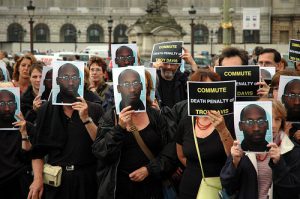By Zachary Rosenfeld, Assistant News Editor, MPP ‘13
Troy Davis – a death row inmate in Georgia who for many had come to personify the injustice and racial skew of the American death penalty – was executed by lethal injection on the evening of Wednesday 9/21. Anti-death penalty activists worldwide collectively held their breaths as the Supreme Court extended Davis a surprise, last-minute reprieve, only to have their hopes dashed when the justices weighed the case and summarily denied him a stay of execution.
According to witnesses, Davis remained defiant even his last moments. Looking directly through the glass window to the taciturn son and brother of the man he allegedly murdered, Davis insisted that they and the state were punishing the wrong person.
“I am innocent,” said Davis. “All I can ask is that you look deeper into this case so you really can finally see the truth.” He then exhorted his supporters to “keep the faith” and said to prison personnel, “May God have mercy on your souls; may God bless your souls.”
The family of the victim, Mark McPhail, was not moved. “He’s been telling himself that for 22 years,” said Annaleise McPhail, the victim’s mother, in a telephone interview with CBS News. “You know how it is; he can talk himself into anything.” Both the McPhails and state prosecutors asserted that justice had finally been served after a long, exhaustive, and in many ways convoluted and frustrating appeals process.
Davis, 44, stood accused in 1991 for the murder of Mark McPhail, a Savannah police officer, during a heated confrontation in a local parking lot. He was convicted and sentenced to death primarily on the testimony of nine witnesses, seven claiming that they had seen Davis shoot McPhail and two others testifying that they had heard Davis admit to committing the crime.
Defenders point to the fact that, aside from their key witnesses, the prosecution presented very little evidence directly tying Davis to the crime, and that most of the evidence that they did present was circumstantial. Later, all but two of these witnesses submitted affidavits rescinding their testimony in whole or in part, some claiming that they had been coerced to false testimony by aggressive Georgia police and others alleging that they had seen another man, Sylvester Coles, murder McPhail. (Coles was one of the two witnesses who did not change his testimony.)
Davis’s execution was delayed a total of four times while Georgia’s courts considered whether new evidence and testimony “clearly established Davis’s innocence.” Each time prosecutors dismissed the defense’s arguments as “smoke and mirrors” with great emotional appeal but little basis in evidence or reality. They demonstrated, for example, that some of the defense’s affidavits were not true recantations at all, and cast doubt on Davis’s strategy when his lawyers failed to allow important witnesses stand for cross-examination. Lower court judges consistently ruled in the prosecutors’ favor, frustrating a defense team who said their hands were tied by an unfair “guilty until proven innocent” standard.
A record 630,000 petitions – signed from supporters from within Georgia, across the United States, and around the world – urged the Georgia Board of Pardons and Paroles to grant Davis clemency. (Georgia’s governor does not have the power to grant clemency.) Anti-death penalty groups directed hundreds of letters towards state officials, while the Innocence Project, famous for exonerating death row inmates through the use of DNA testing, sent a letter to the county district attorney urging him to retract the death order. Groups staged vigils in solidarity across the U.S. and Europe, with signs and T-shirts stating “I am Troy Davis.” Some tried more desperate measures like urging prison workers to stay home and calling Georgia judges at their home addresses.
On the evening of the execution, as many as 700 gathered outside the prison in Georgia and the Supreme Court in Washington, shouting slogans and praying for Davis’s safety.
In Harvard Square, nearly two hundred gathered to take part in a vigil organized by Amnesty International to coincide with Davis’s expected time of execution at 7:00pm. According to Joshua Rubenstein, Amnesty International’s Northeast Director, students and members of Cambridge’s anti-death penalty community joined together to pray, show solidarity, and listen to up-to-the-minute situation updates on Democracy Now! “We were startled by cheering in Georgia,” he recalls. “We didn’t know what to make of it. Maybe something positive had happened, we thought… everyone had their Blackberries out checking for an announcement.”
But hope turned to despair as everyone realized that the reprieve was only a temporary one and that the writing was on the wall. At 11:00pm – four hours behind schedule — Davis was wheeled into the death chamber. He died at 11:08pm.
Davis’s supporters, both on campus and in the community, insist that their fight is not over. “Georgia’s execution of Troy Davis was simply unconscionable,” says Leon Ratz, MPP1. “The decision by authorities to go ahead with the execution despite significant doubts over Davis’s guilt reflects not only the arbitrariness of the application of the death penalty, but also the sheer barbarity of it.” Rubenstein adds: “In 2007 the Board vowed that no execution would go forward unless there was ‘no doubt’ about guilt, a vow that has now been rendered meaningless… Allowing a man to be sent to death under an enormous cloud of doubt about his guilt is an outrageous affront to justice.”
Ratz expects to see renewed interest in anti-death penalty activism among Cambridge’s student community, and hopes that Davis’s death will galvanize change elsewhere in the nation. “The tragedy of his case, I hope, will serve as a wake-up call to policymakers to abolish the death penalty once and for all.”

